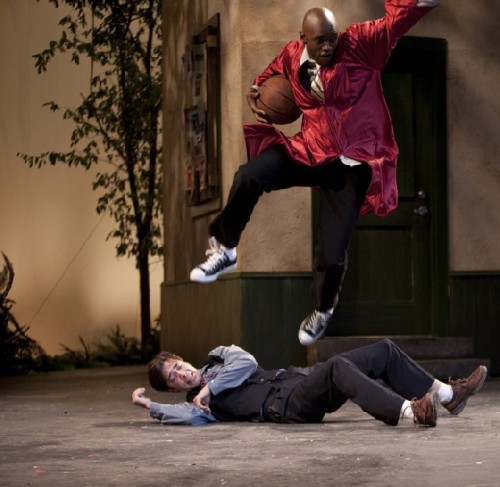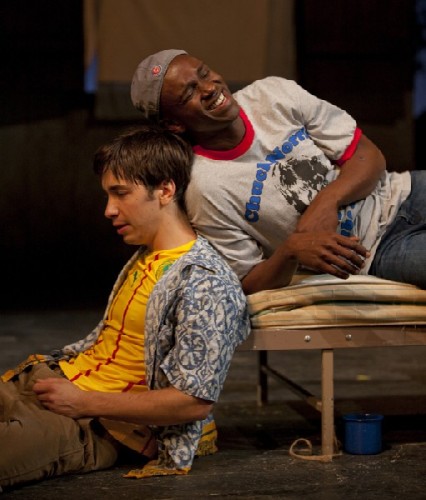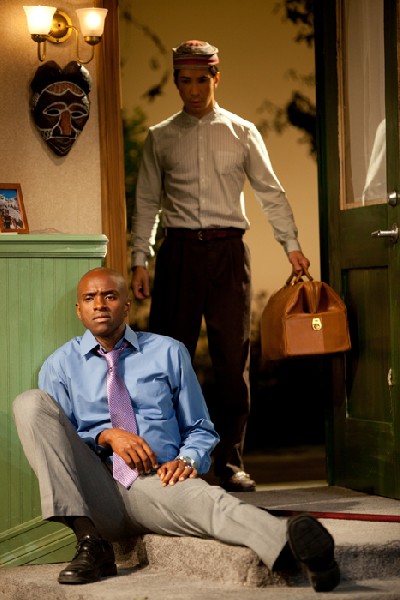Samuel J. and K. by Mat Smart
Williamstown Theatre Festival to July 16
By: Charles Giuliano - Jul 09, 2010
Samuel J. and K.
By Mat Smart
Directed by Justin Waldman
Scenic Design, Adam Stockhausen; Costume Design, Nicole J. Smith, Lighting Design, Marcus Doshi; Sound Design, Bart Fasbender; Fight Director, Thomas Schall; Productions Stage Manager, Michael Rico Cohen; Production Manager, Joel M. Krause; Casting, Melcap Casting.
Starring: Samuel J. (Justin Long), Samuel K. (Owiso Odera)
Williamstown Theatre Festival
Nikos Stage
July 7 to 18
Last night Samuel J. and K. by Mat Smart, which was a work in progress last summer at the Williamstown Theatre Festival, had its world premiere on the Nikos Stage.
The energetic drama, with two superb actors, the similarly named siblings, Samuel J. (Justin Long) and Samuel K. (Owiso Odera) is head and shoulders above the new works which were presented last season on the Nikos Stage. Compared to the season before, when three productions moved to Off Broadway, last year none proved to have legs.
While Samuel J. and K. is bright, smart and engaging it remains to be seen whether it is good enough to have future stagings beyond this production.
The compelling argument for this work is its youthful energy and enthusiasm. The young director, Justin Waldman an Artistic Associate of WTF, has worked with artistic director, Nicholas Martin, for a number of year. Waldman keeps his actors in a blur of perpetual movement.
The play begins and ends with the actors playing one on one, half court basketball. They deliver invective lines informed by sibling rivalry as they drive to the hoop “Bitch.” Reveling in their shots.
There are more than points and brotherly bragging rights on the line. The hard fought game of hoops is a signifier for the deeper issues that inform and sustain the drama.
But in the high energy and relentless momentum of this production lay its conundrum.
While we were presented with an evening of passion and energy it was also short on nuance and insight.
We never came fully to understand and believe in the motivation of their actions. Too much of the plot was a stretch.
When conflict arose between the estranged brothers Waldman opted to have Odera go dead in long icy silences. He refused to make eye contact. But this device failed to convey any genuine feeling or depth of emotion. It just put the brakes on that roller coaster momentum. As a director Waldman seemed to have just two speeds, fast forward, and pause. It was the most simplistic reduction of action and reaction.
It resulted in a stutter step of emotion as the actors attempted to sort through complex and daunting issues.
While brothers, with confusingly similar names, they were as different as, well, black and white.
There’s the rub and nub of the play.
In a plot that’s as old as Cain and Abel they compete for the love of Moms.
Through a development late in the play Long (Samuel J.) returns after a seven year absence and is embraced by his mother as her “One true son.” To the outrage of the adopted Samuel K. who has been spending $4,000 a month to care for her. She suffers from Alzheimer’s disease.
It seems that both men have been abandoned. Samuel J. by his birth father at age four and Samuel K. by his parents when he was three. It seems he was left on the church steps in a plastic bucket. Moms traveled to Cameroon to adopt him.
That there is tension and sibling rivalry is taken as a given by the playwright Mat Smart. He provides the brothers with complex back stories. But we never come fully to understand their characters and differences. While there is that visual contrast of black and white the inherent issues and conflicts are never adequately explored and understood. Regarding his African heritage Samuel K. more or less informs us that he has dealt with it. Duh.
As a college graduation present Samuel J. has purchased two tickets for a week in Cameroon. Although he earns just $10 an hour as a landscaper he has managed to save $6,000 for the graduation present. How you do that on minimum wage is never really explained.
Samuel K. had been hoping for an I Phone or perhaps a gift certificate to Starbucks. He is not thrilled at the prospect of returning to the land of his birth. “You never asked me” he informs his brother. When asked isn’t he curious to revisit his native land the answer is a perfunctory and ungrateful no.
In a forced analogy K. describes visiting the fourth floor of the local hospital where J. was born. There to look out the window at the blue sky. Would that provide any greater insight than a visit to the village where he was born and abandoned? We are asked to digest that.
Once again WTF has supported a new play with superb production values. In a scene change we have traveled from the basketball court to a dank room in La Mare Pogue, Cameroon. The superb set with three changes has been deftly designed by Adam Stockhausen with appropriate lighting design by Marcus Doshi.
J. has sprung for the upscale Hilton in Cameroon but insisted that they spend their last night in a village. As the scene opens they are very wasted on the local palm wine. K. is hobbled wearing a boot for an injury sustained during their graduation night game of hoops. But as the plot evolved it is really J. who is more damaged.
The bug and flea infested hut with a single dank mattress, which they fight over, vividly recalled an evening that Astrid and I spent in a seaside “resort” during two weeks in Senegal. It seems that Smart was inspired by a similar experience in Cameroon.
During that drunken evening things fall apart. J. runs through a litany of million to one odds on why they are brothers. K. blurts out news he had been holding back until they are back home. Several times he had mentioned that the girl friend of J. is more than he deserves. Now he reveals that they are lovers. In the argument that ensues, during which J. leaves, K. states “You are not my brother.”
What else is new? But it is stated in such a flat and blunt manner. The fact, looming over the entire evening, that a black man and a white man, though raised by the same mother, can not truly be brothers is just truncated. Smart raised and then avoided a dialogue about racial differences. He milked the concept but avoided the consequences. In that sense the project tanked for me.
Of course it is a tough issue. Smart is to be credited for trying. But he makes the brothers far too sophisticated and tactful to run through the conflict with full bore energy. But, in this sense, Smart fared no worse than David Mamet who brought the ambitious Race to Broadway and then dropped the ball in an epic disappointment of failed ambition.
Perhaps Smart and Mamet might have gone back and studied the phenomenal plays of the South African, Athol Fugard.
While the second act moved along nicely and clearly absorbed the audience it was riddled with absurdities.
When J. stormed off into the night it seems that he remained in Cameroon for seven years. He married and settled down. Living on a plantation that raised cotton. K. returned home and married J.’s former girlfriend by whom he has twins.
Having been lost for seven years J. arrives home unannounced. There is an angry confrontation. K. the good son, dressed as a business man compared to his farmer brother, wants nothing to do with J. Why have you come back after such a long time K. asks?
It’s a good question for which there is no logical answer. Other than “The play’s the thing.”
In a reversal milked by Waldman’s direction K. is amused and contemptuous as he says of his white brother “You chop cotton?” But the racial slur and taunt just floats and never lands with any resonance. The ironic contrast between the responsible, educated, sophisticated K. and his earthy, sharecropper brother tantalizes without further exploration.
What is never resolved entails why K., the African orphan raised in white American suburbia, never looks back. While his brother abandons white American to find himself as a citizen of Cameroon. It is interesting that both brothers have mixed marriages. Again it is a provocative plot point that leaves us seduced and abandoned.
Not that the play isn't plausible. But it is too much of a stretch. This ambitious play raised but never adequately explored tough and absorbing issues.
Nice try.




